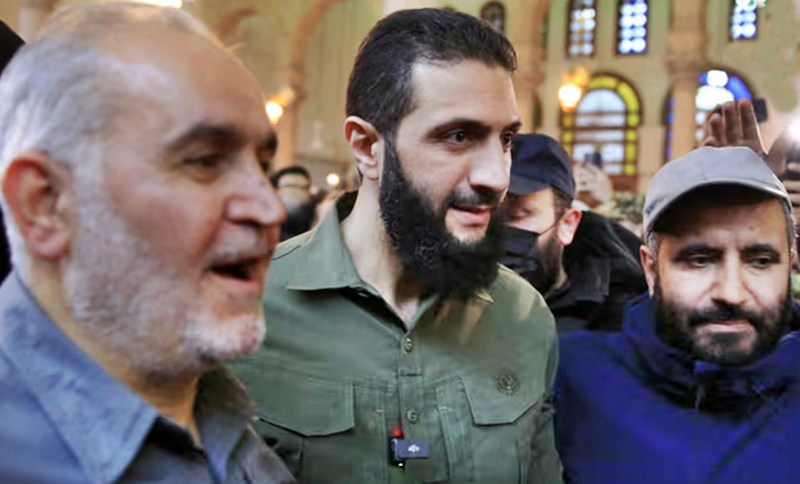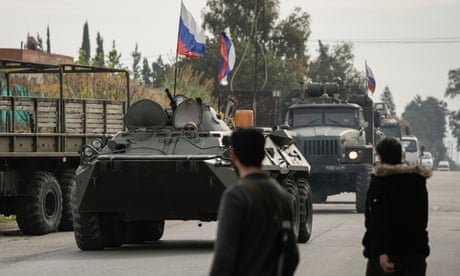Syrian HTS leader says rebel factions that overthrew Assad will be ‘disbanded’

By Guardian staff -Tue 17 Dec 2024 04.59 GMT
HTS leader Ahmed al-Sharaa says fighters will all be ‘subject to the law’ as he sought to emphasise need for unity in post-war Syria.
Syria’s rebel factions will be “disbanded”, the head of the group that led the ousting of Bashar al-Assad has pledged, as he seeks to reassure minorities at home and abroad that the country’s interim leaders will protect all Syrians, as well as state institutions.
Ahmed al-Sharaa, the leader of the Hayat Tahrir al-Sham (HTS) group that toppled Syrian president Bashar al-Assad, said all rebel factions would “be disbanded and the fighters trained to join the ranks of the defence ministry” during a meeting with members of the Druze community.
“All will be subject to the law,” he added, according to posts on the group’s Telegram channel. He also emphasised the need for unity in the multi-ethnic and multi-confessional country.

“Syria must remain united,” he said. “There must be a social contract between the state and all religions to guarantee social justice”.
In a separate meeting with a British delegation, Sharaa, who was formerly known by his nom de guerre Abu Mohammed al-Jolani, also said that international sanctions against Damascus must be lifted if refugees displaced by the war are to return.
He spoke “of the importance of restoring relations” with London, and stressed “the importance of ending all sanctions imposed on Syria so that displaced Syrians … can return to their country”, according to remarks reported on his group’s Telegram channel on Monday.
After Assad’s fall last week, European countries including the UK, Germany, France, Italy, Sweden and Norway among others said they were suspending the processing of asylum applications from Syrians, despite the lack of clarity about what lies ahead for the country.
The US and European Union had placed wide-ranging sanctions on the Assad regime, including bans on weapons sales to Syria and oil imports from the country and a ban on investment in its oil industry.
The sanctions have played a part in crippling the wartorn country’s economy; hyper inflation is rampant and at least 70% of the population lives in poverty.

Assad’s fall has left western countries with the dilemma of how to deal with HTS, which has its roots in al-Qaida. It maintains it has renounced jihadism yet has been accused of human rights abuses and remains proscribed as a terrorist group by the UN and several western countries, including the US and UK.
The EU’s new foreign policy chief, Kaja Kallas, said on Monday that the bloc should be ready to ease sanctions on Syria if the country’s new leadership takes “positive steps” to establish an inclusive government and respect women’s and minority rights.
“We want to see no extremism, no radicalisation,” Kallas said, adding that HTS was “saying the right things” so far but the group would be judged on its actions. Kallas said she had sent a senior diplomat to meet officials from HTS.

The decision by many European governments to suspend processing asylum applications has been greeted with dismay by Syrian refugees, many of whom are fearful of returning to their country of birth and who have built new lives in their adopted countries.
But in Germany, which took in nearly 1 million refugees during the war and which is now home to Europe’s largest Syrian diaspora, the opposition CDU party – expected to win elections early next year – has already begun calling for Syrian refugees to be returned to their homeland.
In the UK, home secretary Yvette Cooper has said the government is monitoring the situation, which she described as “very unstable at the moment”. Refugee advocates have called the decision to suspend processing of applications “cruel”.
The comments came shortly after Assad broke his silence for the first time since fleeing Syria to Russia, claiming he had been evacuated from a military base at Moscow’s request. Russia, along with Iran and Lebanon’s Hezbollah, helped prop up Assad’s rule.
“My departure from Syria was neither planned nor did it occur during the final hours of the battles, as some have claimed,” said a statement from Assad on the ousted presidency’s Telegram channel.
“Moscow requested that the base’s command arrange an immediate evacuation to Russia,” he added.
“When the state falls into the hands of terrorism and the ability to make a meaningful contribution is lost, any position becomes void of purpose.”
Agence France-Press and Reuters contributed to this report.
